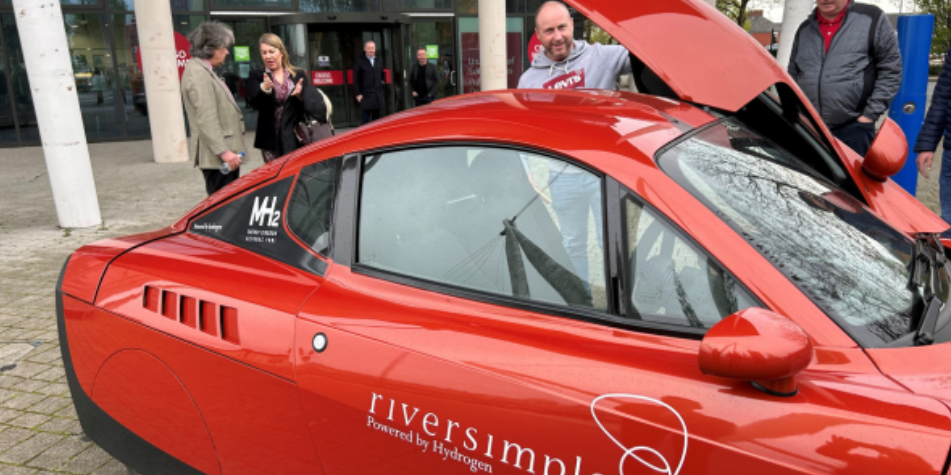Latest News

Welsh Manufacturers Inspired by Strategies for Success
What are the strategies for success in Manufacturing? Manufacturing Wales recently asked this question at their event. In response Hugo Spowers MBE founder of Riversimple and Lee Collinson, Managing Director, UK Head of Manufacturing, Transport and Logistics, Barclays Corporate, gave some inspiring and different ways of looking at this.
What is the future of energy and transportation? Hugo of Riversimple aims to systematically pursue the elimination of the environmental impact of personal transport. An item high on most agendas. We have all heard about electric cars, many will own one, chances are it runs on batteries. But how environmentally friendly is this when we consider the requirement of lithium and precious materials to make them? We are starting to question how these are made and obtained. But…. Have you ever thought about driving a hydrogen car? Probably not. However, this is not a new concept, a fuel cell was first demonstrated by a Welshman in 1839, however it wasn’t until 1994 when the first road legal hydrogen car was first seen. Since then, hydrogen fuel cell transportation has been used widely in commercial vehicles, buses, forklifts etc. but this hasn’t yet spread to the car market. Until now….
Riversimple, a Welsh manufacturer, are now creating some of the world’s first available road legal hydrogen cars. After a number of iterations, the first Riversimple car will go into commercial production soon. However, just as the car is a new concept for many, so is the sale. Riversimple will sell cars to customers as a subscription service, based on lifetime cost. This is radically different to the current norm which is based on the production cost. The strategy also considers how to use available materials more wisely, and use materials that are widely available, which don’t cause shortages, to use existing technology in new ways.
In short, thinking differently about to use technology in new ways is something manufacturers do, and applying this to the manufacture of new cars is the perfect application.
As Hugo concluded “you can never change things by fighting the existing reality, to change something build a new model that makes the existing model obsolete.”
Lee Collinson, who leads the Manufacturing sector for Barclays outlined different strategies for success that he had discovered after talking to a large number of manufacturers across the UK. He has brought together in his recent report Chain Reaction. In this report supply chain resilience is at the heart of success for manufacturers and Lee outlined some shocking statistics: Over £23bn worth of UK goods are stuck because they can’t be completed. 70% of manufacturers say they faced this issue where they cannot finish goods and dispatch them. This is especially worrying because manufacturers don’t get paid for unfinished goods, and it is leading to delays for customers in over 50% of manufacturing firms. This has meant that over 40% of manufacturers have had to increase their storage space. Finding the right skills is a perennial problem for Manufacturing Wales members and Lee explained this was similar across the UK with vacancies of 14% (250,000 jobs) across manufacturing jobs - finding skilled people is a real challenge. The result has been that 47% of manufacturers have lengthened their fulfilment times.
Lee also outlined the geo-political context for manufacturing, Brexit, Covid and the Ukrainian war all having a big impact, which has been something Manufacturing Wales members have mentioned too.
However, with some fresh thinking Lee outlined a number of practical steps to help overcome these problems. The top solution taken by 39% of manufacturers surveyed was to increase storage space and hold more stock. The next solutions are to look at supply chains and both increase the number of suppliers and look to UK suppliers. One interesting solution is “friend-shoring” moving suppliers to more stable and less politically volatile countries. Finally, 32% of manufacturers are looking to bring their supply inhouse. This latter factor has certainly been used by Manufacturing Wales members who have achieved this often by acquisitions or mergers.
The strategies for success based on Lee’s extensive research are 1) Monitor your supply chain. 2) Take a fresh look and your suppliers. 3) Consider financing solutions (working capital v trade loans), and 4) Seek export help and use the support around you via UK Export Finances, expertise in banks or Trade Loan, FX, Letters of credit.
Despite all the challenges of supply, staffing energy costs and changing world trade conditions Manufacturers are quietly confident in the future, which is a great message to end on.
If you are manufacturing in Wales and want to connect with other manufactures, create closer links with HE/ FE and industry focussed partners email heather@manufacturingwales.com to find out how we can help you.
